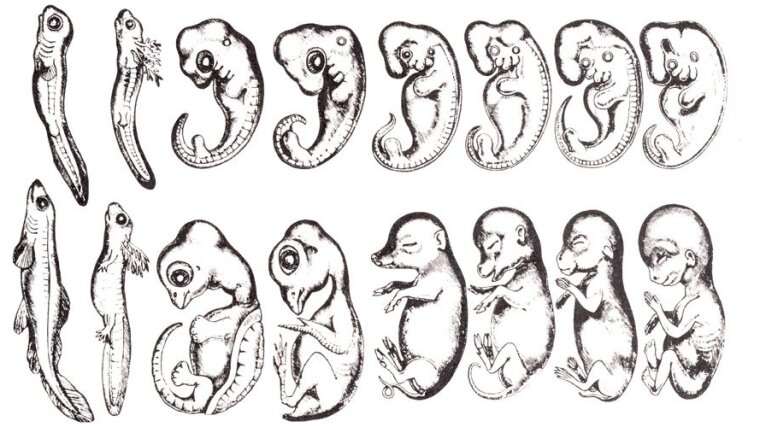
22.–24. November 2024
The theme of the 64th Phylogenetic Symposium is Ernst Haeckel’s “Biogenetic Law,” which states that the development of an individual is a short recapitulation of the evolutionary history. This rule was published by Ernst Haeckel in 1866 in volume II of the “Generelle Morphologie der Organismen”. Based on this rule, Ernst Haeckel also hypothesized a last common ancestor of all animals is “Gastraea”, which reflects the embryonic stage of the gastrula. Together, the recapitulation theory also influenced the use of embryology as criterion of homology.
With the resurgence of interest in comparative developmental biology (“evodevo”) and the application of the latest molecular methods, the “biogenetic law” has experienced a revival. Comparative transcriptomic studies and gene expression analyses during development detected a conserved mid-stage of development (“phylotypic stage”), during which the oldest genes are expressed, when the gene age is determined by phylogenetic analyses. Newest molecular approaches, such as gene regulatory network studies, chromatin conformation and single-cell transcriptomic approaches will be analyzed in the context of the recapitulation theory. The data will be discussed in the light of the exceptions that have been brought up from the opponents of Ernst Haeckel’s biogenetic law. General embryonic diversity will be discussed on the background of novel technologies to gain a state-of-the-art view on the “biogenetic law” and its possible interpretations. Optimally, it will also lead to novel research questions that can be addressed in a collaborative effort.
Registration
The registration for this meeting is now closed. In exceptional cases we can adopt a late registration. Please contact us in this case by email.
Accomodations in Jena (selection)
Hotel VielHarmonieExterner Link
Braugasthof PapiermühleExterner Link
Pension KatzschmannExterner Link
Hotel Schwarzer BärExterner Link
-
Speakers
Georgy Levit (Friedrich-Schiller-University Jena, Germany)
The history of Ernst Haeckel’s “biogenetic law”Oleg Simakov (University Vienna, Austria)
Chromatin conformation and gene regulation on the genomic level
Natascha Turetzek (Ludwig-Maximilians-University Munich, Germany)
Recurrent and convergent patterns in arthropod developmentVeronica Hinman (Carnegie Mellon University, USA)
Homology and recapitulation in developmental gene regulatory networksCasey Dunn (Yale University, USA)
Transcriptomic comparisons and phylogenetic methods
Naoki Irie (Research Center for Integrative Evolutionary Science, Japan)
The hourglass model in comparative transcriptomicsAndreas Hejnol (Friedrich-Schiller-University Jena, Germany)
Embryological adaptations -
Program at a glance
Friday, November 22
18:00 – 21:00 Arrival and registration in the foyer of the Phyletic Museum
19:00 Ice Breaker (Phyletisches MuseumExterner Link)
21.00 – Optional: Participation in the „Lange Nacht der Wissenschaften JenaExterner Link“
Saturday, November 23
(Großer Hörsaal, Erbertstrasse 1)
09:00 – 09:15 Prof. Dr. Andreas Marx, President of the Friedrich Schiller University Jena
Welcome address09:15 – 09:30 Andreas Hejnol (FSU Jena)
Introduction to the Phylogenetic Symposium09:30 – 10:30 Georgy Levit (FSU Jena, Germany)
The history of Ernst Haeckel’s “biogenetic law”10:30 – 11:00 Coffee Break
11:00 – 12:00 Andreas Hejnol (FSU Jena, Germany)
Embryonic adaptations12.00 – 13.30 Open lunch
13.30 – 14:30 Oleg Simakov (University of Vienna, Austria)
Genomic 'atavisms': the causes and consequences of deeply conserved synteny14:30 – 15:00 Coffee break
15:00 – 16:00 Natascha Turetzek (Ludwig-Maximilians-University Munich, Germany)
Recurrent and convergent patterns in arthropod development16:00 – 17:00 Veronica Hinman (Carnegie Mellon University, USA)
Homology and recapitulation in developmental gene regulatory networks19:30 – Conference dinner at “Papiermühle”
Sunday, November 24
(Großer Hörsaal, Erbertstrasse 1)
09:00 – 10:00 Casey Dunn (Yale University, USA)
Comparative transcriptomics and phylogenetic methods10:00 – 11:00 Naoki Irie (Research Center of Integrative Evolutionary Science, Japan)
The hourglass model in comparative transcriptomics11:00 – 11:30 Coffee break
11:30 – 12:30 LIFE Conference Panel Discussion – Speakers and Moderator
12.30 – 12.40 Andreas Hejnol (FSU Jena, Germany)
Farewell13.00 – Optional: guided tour through the collection of the Phyletic Museum with focus
on Ernst Haeckel’s samples -
Social events
Icebreaker at the Institute for Zoology and Evolutionary Research
Conference dinner at the "Papiermühle": https://www.jenaer-bier.de/Externer Link
-
Organizers
Andreas Hejnol
Contact
Andreas Hejnol | andreas.hejnol@uni-jena.deExterner Link
Website: https://hejnol-lab.comExterner Link
